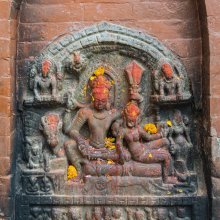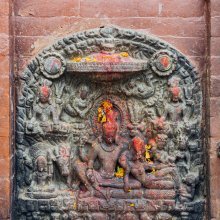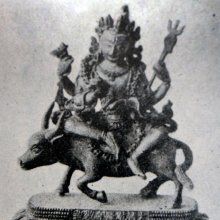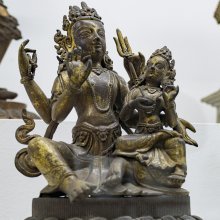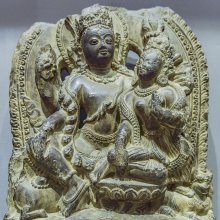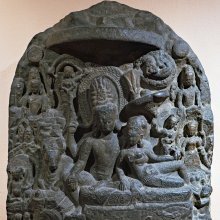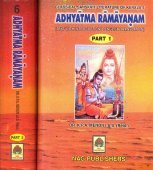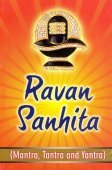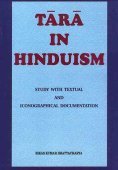Maheshvara, Maheśvara, Māheśvara, Maha-ishvara: 34 definitions
Introduction:
Maheshvara means something in Buddhism, Pali, Hinduism, Sanskrit, Jainism, Prakrit, the history of ancient India, Hindi. If you want to know the exact meaning, history, etymology or English translation of this term then check out the descriptions on this page. Add your comment or reference to a book if you want to contribute to this summary article.
Maheshvara has 33 English definitions available.
The Sanskrit terms Maheśvara and Māheśvara can be transliterated into English as Mahesvara or Maheshvara, using the IAST transliteration scheme (?).
Images (photo gallery)
(+7 more images available)
Languages of India and abroad
Sanskrit dictionary
[Deutsch Wörterbuch]
Source: Cologne Digital Sanskrit Dictionaries: Böhtlingk and Roth Grosses Petersburger WörterbuchMaheśvara (महेश्वर):—
1) m. (mahā + ī) a) der grosse Herr, Oberherr, Haupt [Medinīkoṣa r. 292.] tamīśvarāṇāṃ paramaṃ maheśvaram [ŚVETĀŚV. Upakośā 6, 7.] tridaśānām (Indra) [Mahābhārata 1, 8261.] loka Beiname Kṛṣṇa’s [Bhagavadgītā 10, 3.] sarvaloka desgl. [5, 29.] Śiva’s [Rāmāyaṇa 1, 37, 13.] devāsura (Śiva) [Mahābhārata 13, 1260.] Ohne Ergänzung pl. Bez. der Welthüter Indra, Yama, Agni und Varuṇa [Nalopākhyāna 3, 8. 4, 23. 5, 21.] sg. Gott (im Gegens. zu prakṛti) [ŚVETĀŚV. Upakośā 4, 10.] [Weber’s Indische Studien 2, 92.] [MUIR, Stenzler 3, 5. 71. 222.] Insbes. Beiname Śiva’s [Amarakoṣa.1,1,1,25.3,4,9,37.] [Hemacandra’s Abhidhānacintāmaṇi 198.] [Medinīkoṣa] [Pariśiṣṭa des Atharvaveda 42,3.] [Weber’s Indische Studien.4,359.] [Mahābhārata.1,1154. 7701. 12,12957. 14,141.] [Harivaṃśa 7586.] [Rāmāyaṇa.1,37,27. 44,5. 76,17.5,5,7.] [Raghuvaṃśa.3,49.] [Spr. 9. 2159.] [Kathāsaritsāgara 69,37.] [Viṣṇupurāṇa 65. 66.] [Mārkāṇḍeyapurāṇa 51,56.] [Oxforder Handschriften 45,a,6. 76,a,6. 103,a,31.] [Rgva tch’er rol pa ed. Calc. 340,1 v. u.] [WASSILJEW] 198. 214. [Hiouen-Thsang 1,124. 237. 264. 354.2,157. 178.] liṅga [KṢITĪŚ. 26, 4.] Bez. Viṣṇu’s [WEBER, Rāmatāpanīya Upaniṣad 352.] [Spr.] [?4512(?).] — b) Nomen proprium eines Devaputra [Rgva tch’er rol pa ed. Calc. 3, 16. 4, 15. 6, 19. 7, 12.] [Lot. de Lassen’s Anthologie b. l. 3.] eines Yakṣa [Burnouf 256.] — c) Nomen proprium verschiedener Männer [Siddhāntaśiromaṇi 13,61.] [Weber’s Verzeichniss No. 687. 843.] [Oxforder Handschriften 327,a, No. 774.] [Weber’s Verzeichniss No. 802. 820. 967.] [Hemacandra’s Abhidhānacintāmaṇi 528,] [Randgl.] [Oxforder Handschriften 113,b,2. 150,b,33. 185,b,40. 187,b,15. 37. 207,b, No. 488.] [HALL] in der Einl. zu [VĀSAVAD. 18. 46. 54.] Inschr. in Journ. of the Am. Or. [S. 6, 508, Śloka 32.] tīrtha [Weber’s Indische Studien 1, 468.] nyāyālaṃkāra [Bibliothecae sanskritae 339.] vaidya [Colebrooke II, 58.] —
2) f. ī (mahā + ī) a) die grosse Frau, Beiname der Durgā [TANTRASĀRA im Śabdakalpadruma] Bez. der Dākṣāyaṇī in Mahākāla [Oxforder Handschriften 39,b,18.] — b) eine Art Messing, = brahmarīti [Hemacandra’s Abhidhānacintāmaṇi 1048.] = rājarīti [Rājanirghaṇṭa im Śabdakalpadruma] — — c) Clitoria Ternatea Lin. [Śabdacandrikā im Śabdakalpadruma] — Vgl. bhūtamaheśvara, māheśvara .
--- OR ---
Māheśvara (माहेश्वर):—(von maheśvara)
1) adj. f. ī auf den grossen Herrn (Śiva) bezüglich, ihm gehörig u. s. w.: pada [Mahābhārata 13, 815.] cāpa [Harivaṃśa 2330.] tanu [Mārkāṇḍeyapurāṇa 109, 71.] parṣad [Rājataraṅgiṇī 2, 127.] yuga [Harivaṃśa 3019.] kalpa (s. u. kalpa 2, d.). jvara [Harivaṃśa 9556.] dharmāḥ [Oxforder Handschriften 266,b,15.] yoga [52,b,4.] stotra [Harivaṃśa 14860.] yajña [Rāmāyaṇa 4, 37, 31.] vedāṅga [Weber’s Indische Studien 1, 17, 1.] upapurāṇa [18,18.] [Oxforder Handschriften.8,a,9. 65,b,13. 80,a,6.] tantra [104,a,16.] śākunaśāstrasāra [Weber’s Verzeichniss No. 897.] dhārā Nomen proprium eines heiligen Badeplatzes [Mahābhārata 3, 8095.] pada desgl. [8097.] pura desgl. [8107.] māheśvare pure [Oxforder Handschriften 39,b,20.] —
2) adj. Śiva verehrend; m. ein Verehrer des Śiva: janāḥ [Harivaṃśa 14844.] [Kathāsaritsāgara 25, 230.] [Colebrooke I, 406. fgg.] [BANERJEA 270.] [Rājataraṅgiṇī 1, 154.] parama Inschr. in [Journ. of the Am. Or. S. 6, 539, 2.] Davon nom. abstr. māheśvaratā [Rājataraṅgiṇī 1, 135. 3, 453.] Vgl. mahāmāheśvara . —
3) f. ī a) Maheśvara’s Energie [Oxforder Handschriften 25,b, Nalopākhyāna 5.] unter den sieben göttlichen Müttern [?184,a,4. Mitākṣarā 142,10. Hemacandra’s Abhidhānacintāmaṇi 201, Scholiast Śabdaratnāvalī im Śabdakalpadruma] = Durgā ebend. [Mahābhārata 14,1184.] [Oxforder Handschriften 71,b,12.] tantra [108,b,36. 109,a,25.] — b) Nomen proprium eines Flusses [Śatruṃjayamāhātmya 1, 54.] — c) eine best. Schlingpflanze, = yavatiktā [Rājanirghaṇṭa im Śabdakalpadruma]
--- OR ---
Māheśvara (माहेश्वर):—
2) [SARVADARŚANAS. 74, 6. 80, 14. 90, 17. 97, 11.]
Source: Cologne Digital Sanskrit Dictionaries: Sanskrit-Wörterbuch in kürzerer FassungMaheśvara (महेश्वर):——
1) m. — a) ein grosser Herr , Oberherr , Haupt. — b) Gott. — c) Bez. — α) Śiva's. — β) Viṣṇu's. — γ) Pl. der Welthüter Indra , Yama , Agni und Varuṇa. — d) Nomen proprium — α) eines Devaputra. — β) verschiedener Männer. —
2) f. ī — a) Beiname der Durgā. — b) Name der Dākṣāyaṇi in Mahākāla. — c) *eine Art Messing [Rājan 13,29.] — d) *Clitoria ternatea.
--- OR ---
Māheśvara (माहेश्वर):——
1) Adj. (f. ī) — a) auf den grossen Herrn (Śiva) bezüglich , ihm gehörig u.s.w. dhārā Nomen proprium eines heiligen Badeplatzes. — b) Śiva verehrend. —
2) m. ein Verehrer des Śiva , ein Śivait. Vier Secten derselben [Govindānanda .S.592.] parama [Kād. (1872) 249,11.] [Harṣacarita 71,10.] Nom.abstr. tā f. —
3) f. ī — a) Śiva’s Energie , eine der sieben göttlichen Mütter , = ddhargā. — b) *eine best. Pflanze [Rājan 3,65.] — c) Nomen proprium eines Flusses.
Sanskrit, also spelled संस्कृतम् (saṃskṛtam), is an ancient language of India commonly seen as the grandmother of the Indo-European language family (even English!). Closely allied with Prakrit and Pali, Sanskrit is more exhaustive in both grammar and terms and has the most extensive collection of literature in the world, greatly surpassing its sister-languages Greek and Latin.
See also (Relevant definitions)
Partial matches: Ishvara, Maha.
Starts with (+27): Maheshvara bhatta, Maheshvara bhattacarya, Maheshvara mishra, Maheshvara nyayalamkara bhattacarya, Maheshvara sharman, Maheshvara-putra, Maheshvarabala, Maheshvarabhatta, Maheshvarabhattiya, Maheshvaradanta, Maheshvaradatta, Maheshvaradharma, Maheshvaradharmadharma, Maheshvaradhupa, Maheshvaradikshita, Maheshvaradikshitiya, Maheshvaradipa, Maheshvarajvara, Maheshvarakarachyuta, Maheshvarakaracyuta.
Ends with (+4): Atyanta-maheshvara, Bhutamaheshvara, Devasuramaheshvara, Dinmaheshvara, Hamsamaheshvara, Kadanamaheshvara, Laditamaheshvara, Lokamaheshvara, Mahamaheshvara, Odamaheshvara, Odramaheshvara, Parama-maheshvara, Rudra-maheshvara, Sarvalokamaheshvara, Shabdarashimaheshvara, Shri-maheshvara, Subuddhi mishra maheshvara, Subuddhimishramaheshvara, Svachandamaheshvara, Udaramaheshvara.
Full-text (+502): Mahamaheshvara, Maheshvari, Mahesha, Maheshvarakaracyuta, Upapurana, Pashutva, Sabhanataka, Maheshvaratva, Rudra-maheshvara, Parama-maheshvara, Mahesara, Shivabhagavata, Jvara, Maheshvarapada, Maheshvarata, Maheshvaratantra, Maheshvarapura, Duhkhanta, Vishvaprakasha, Maheshvaropapurana.
Relevant text
Search found 124 books and stories containing Maheshvara, Maha-ishvara, Mahā-īśvara, Maha-isvara, Maheśvara, Māheśvara, Mahesvara, Mahēśvara, Māhēśvara; (plurals include: Maheshvaras, ishvaras, īśvaras, isvaras, Maheśvaras, Māheśvaras, Mahesvaras, Mahēśvaras, Māhēśvaras). You can also click to the full overview containing English textual excerpts. Below are direct links for the most relevant articles:
Chaitanya Bhagavata (by Bhumipati Dāsa)
Verse 1.1.7 < [Chapter 1 - Summary of Lord Gaura’s Pastimes]
Verse 1.1.178 < [Chapter 1 - Summary of Lord Gaura’s Pastimes]
Verse 3.4.484 < [Chapter 4 - Descriptions of Śrī Acyutānanda’s Pastimes and the Worship of Śrī Mādhavendra]
Rudra-Shiva concept (Study) (by Maumita Bhattacharjee)
2. Rudra-Śiva in the Upaniṣadic Literature < [Chapter 4 - Rudra-Śiva in the Post-Brāhmaṇic Literature]
4. Forms of Śiva and his different activities < [Chapter 5 - Rudra-Śiva in the Purāṇic Literature]
2.3. Rudra as Śarva < [Chapter 6a - The Epithets of Rudra-Śiva]
Impact of Vedic Culture on Society (by Kaushik Acharya)
Chart: Religious beliefs of the Kings who ruled in Northern India < [Chapter 4]
Mingling of Cultures (C): The Maitrakas < [Chapter 4]
Religious Epithets (Brahmanical and Buddhist) < [Chapter 4]
Brihad Bhagavatamrita (commentary) (by Śrī Śrīmad Bhaktivedānta Nārāyana Gosvāmī Mahārāja)
Verse 2.3.75 < [Chapter 3 - Bhajana (loving service)]
Verse 2.4.226 < [Chapter 4 - Vaikuṇṭha (the spiritual world)]
Verse 2.3.62 < [Chapter 3 - Bhajana (loving service)]
Historical Elements in the Matsya Purana (by Chaitali Kadia)
Name of the Purāṇas < [Chapter 1 - An Introduction of the Purāṇas]
Varṇa (1): The Brāhmaṇas (Brahmins) < [Chapter 5 - Cultural history in the Matsya-Purāṇa]
Later Chola Temples (by S. R. Balasubrahmanyam)
Temples in Udaiyalur < [Chapter II - Temples of Kulottunga I’s Time]
Temples in Tirukkannapuram < [Chapter II - Temples of Kulottunga I’s Time]
Temples in Nagar < [Chapter X - Temples of Rajadhjraja II’s Time]
Related products
(+3 more products available)
